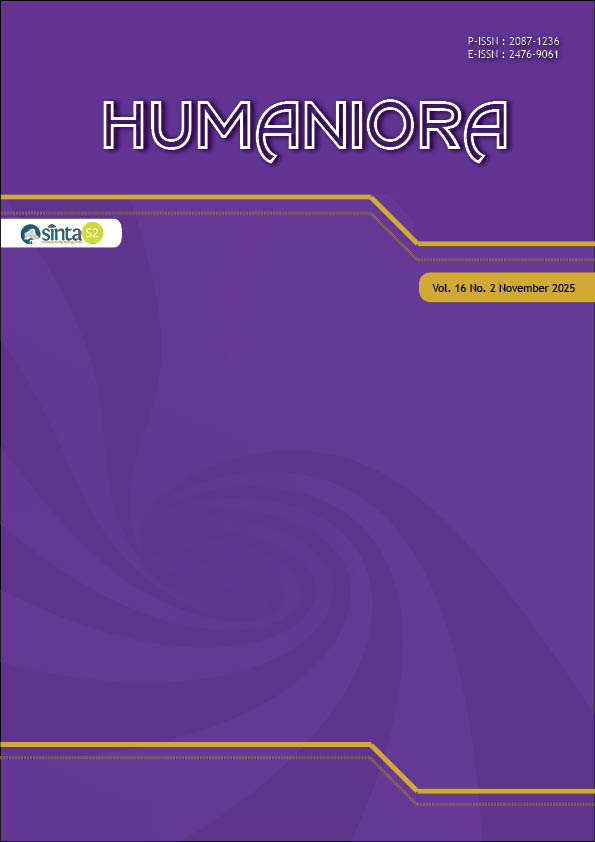Sociopreneurship in Ecotourism: Strengthening Village Economies Around Tanjung Puting National Park
DOI:
https://doi.org/10.21512/humaniora.v16i2.13433Keywords:
ecotourism, sociopreneurship, TNTP, village economyAbstract
Tanjung Puting National Park (TNTP) in Central Kalimantan is an internationally recognized ecotourism destination that significantly contributes to national revenue and plays a crucial role in shaping regional socioeconomic development. This research examines the role of sociopreneurship in promoting the economic sustainability of rural communities through ecotourism development, focusing on Bahaur Village and Pembuang Hulu I Village, both of which maintain a direct connection to the TNTP area. A qualitative case study approach is employed, combining participant observation, in-depth interviews with ten key informants (including village heads, secretaries, freshwater fish farming group leaders, and community figures), and an analysis of village deliberation documents. Data analysis follows three main stages—intuition, analysis, and description—supported by a SWOT framework to identify strengths, weaknesses, opportunities, and threats. To ensure data validity, triangulation is applied by comparing and cross-verifying information from interviews, observations, and documents to identify consistent patterns and reduce potential bias. The findings indicate that although ecotourism has the potential to increase local income, it has not yet effectively strengthened community-based business development. The primary challenges include weak infrastructure, limited training opportunities, and inadequate marketing strategies, which have compelled some residents to revert to environmentally harmful economic activities. The implications underscore the need for strategic planning, capacity building, mentoring, market access facilitation, and multi-stakeholder collaboration to diversify the local economy and sustain community enterprises within conservation areas.
References
Adhuze, O., Adewole, A., & Adeaga, O. (2023). Infrastructure as drivers for economic growth: A way to advancing tourism. International Journal of Latest Technology in Engineering, Management & Applied Science (IJLTEMAS), 7(9), 86-93. https://doi.org/10.51583/IJLTEMAS
Aliansyah, H., & Hermawan, W. (2021). Peran sektor pariwisata pada pertumbuhan ekonomi Kabupaten/Kota di Jawa Barat. Bina Ekonomi, 23(1), 39-55. https://doi.org/10.26593/be.v23i1.4654.39-55
Ardela, V. I. (2023). Kecamatan Hanau dalam angka 2023. BPS Kabupaten Seruyan.
Badr, M. E. M. (2022). Challenges and future of the development of sustainable ecotourism. International Journal of Modern Agriculture and Environment, 2(2), 54-72.
Balai TNTP. (2021). Tingkatkan peran serta masyarakat, Balai TN Tanjung Puting jalin dua kesepakatan konservasi. KSDAE, Direktorat Jenderal Konservasi Sumber Daya Alam Dan Ekosistem. https://ksdae.menlhk.go.id/artikel/10186/Tingkatkan-Peran-Serta-Masyarakat-Balai-TN-Tanjung-Puting-Jalin-Dua-Kesepakatan-Konservasi.html
Baloch, Q. B., Shah, S. N., Iqbal, N., Sheeraz, M., Asadullah, M., Sourath, M., & Khan, A. U. (2023). Impact of tourism development upon environmental sustainability: A suggested framework for sustainable ecotourism. Environmental Science and Pollution Research, 30, 5917-5930. https://doi.org/https://doi.org/10.1007/s11356-022-22496-w
Balsalobre-Lorente, D., Luzon, L. I., Usman, M., & Jahanger, A. (2023). The relevance of international tourism and natural resource rents in economic growth: Fresh evidence from MINT countries in the digital era. Environmental Science and Pollution Research, 30, 81495-81512. https://doi.org/https://doi.org/10.1007/s11356-022-25022-0
Bawi, S. V. (2025). Revitalizing ritual performances for environmental conservation and climate change adaptation: A case study of ecotourism in Khaw Nu M’cung National Park, Myanmar. Forest and Society, 9(1), 48-69. https://doi.org/10.24259/fs.v9i1.33163
Biradar, S. (2023). The role of ecotourism in sustainable development. Inclusive Community Development Through Tourism and Hospitality Practices, 5(6), 620-625. https://doi.org/10.29121/shodhkosh.v5.i6.2024.4169
BPS. (2023). Kecamatan Hanau dalam angka 2023: Hanau Subdistrict in figures 2023. Badan Pusat Statistik Kabupaten Seruyan. https://seruyankab.bps.go.id/publication/2023/09/26/4ad568998bfc77602165f06b/kecamatan-hanau-dalam-angka-2023.html
BPS. (2024). Kecamatan Hanau dalam angka. BPS Kabupaten Seruyan. https://web-api.bps.go.id/download.php?f=r1T1sIpY2Ar80lomUzLv/EE2WjFeHM1YjBYRFZka0NKc0JHcnIvOUtPNHNLTkFoV3hpUmZLcExHZ0JLajJZaTJjY1RqSG50WFZna3RhcHhnSURrUjBBSXM1VWVoNXAzVkNNVHFsTFp4cWZXaEFOZHZJUW1qUlN6cGREdTlnaGpad0kyWU95Y051RUo5NE1Ya HNQRWRK T0lYK0dXUDhtTm
Br, A. R., Sitepu, D. S. S. B., Elixabhet, G., Siburian, R., & Adianingsih, Z. R. (2024). Peranan advokasi LSM dalam mendorong penegakan hukum dan HAM di era Reformasi. Journal Of Law And Social Society, 1(2), 1-13. https://doi.org/10.70656/jolasos.v1i2.128
Brass, J. N. (2021). Do service provision NGOs perform civil society functions? Evidence of NGOs’ relationship with democratic participation. Nonprofit and Voluntary Sector Quarterly, 51(1), 148-169. https://doi.org/10.1177/0899764021991671
Choo, S. L., & Halim, T. B. (2022). Advancing sustainable tourism development and its contribution to poverty reduction and development: Perspective from Malaysia. Journal of Hospitality & Tourism Management, 5(1), 1-13. https://doi.org/10.53819/81018102t4032
Cresswell, J. W., & Poth, C. N. (2018). Qualitative inquiry and research design: Choosing among five approaches (4th Ed.). Sage Publications.
Da Silva, A. E., Maracajá, K. F. B., Batalhão, A. C. S., Silva, V. F., & Borges, I. M. S. (2025). Ecotourism and co-management: Strengthening socio-ecological resilience in local food systems. Sustainability, 17(6), 1-25. https://doi.org/10.3390/su17062443
Dadi. (2022). Ekonomi dan ekologi: Dampak terhadap pembangunan ekowisata. Journal of Management and Business (JOMB), 4(1), 137-153. https://doi.org/10.31539/jomb.v4i1.3662
Demkova, M., Sharma, S., Mishra, P. K., Dahal, D. R., Pachura, A., Herman, G. V., Kostilnikova, K., Kolesárová, J., & Matlovicova, K. (2022). Potential for sustainable development of rural communities by community-based ecotourism a case study of rural village Pastanga, Sikkim Himalaya, India. Geojournal of Tourism and Geosites, 43(3), 964-975. https://doi.org/10.30892/gtg.43316-910
Dimyati, K., Nashir, H., Elviandri, Absori, Wardiono, K., & Budiono, A. (2021). Indonesia as a legal welfare state: A Prophetic-transcendental basis. Heliyon, 7(8). https://doi.org/10.1016/j.heliyon.2021.e07865.
Ermayanti, E., Rahman, F., & Irwandi, A. (2025). Community-based tourism development and commodificiation in Sarugo Tourism Village. Humaniora, 15(2), 149-160. https://doi.org/10.21512/humaniora.v15i2.12043
Farel, F., Sutiarso, M. A., & Tanjungsari, K. R. (2023). Community empowerment and customary attachments support participation in Aan Tourism Village development. Jurnal Ilmiah Ilmu Terapan, 7(62271417), 611-616. https://doi.org/10.22437/jiituj.v7i1.26650
Fatchan. (2015). Metode penelitian kualitatif: Pendekatan etnografi dan etnometodologi untuk penelitian ilmu-ilmu social (K. N. Nugrahini (ed.)). Ombak.
Geradts, T. H. J., & Alt, E. (2022). Social entrepreneurial action in established organizations: Developing the concept of social intrapreneurship. Journal of Business Research, 151, 197-206. https://doi.org/https://doi.org/10.1016/j.jbusres.2022.06.047
Hadi. (2019). Taman Nasional Tanjung Puting, melestarikan alam dan mendorong pembangunan wilayah. Jakarta: Kementerian Lingkungan Hidup Dan Kehutanan, PPID/Biro Hubungan Masyarakat.
Helmi, M., & Naparin, M. (2023). The influence of ecotourism performance on quality tourism and sustainable tourism in Swargaloka Ecotourism, Haur Gading District, North Hulu River District, South Kalimantan. Revista de Gestão - RGSA, 17(5), e03505. https://doi.org/10.24857/rgsa.v17n5-017
Herrold, C. E., & AbouAssi, K. (2022). Can service providing NGOs build democracy? Five contingent features. Public Administration and Development, 43(1), 80-91. https://doi.org/10.1002/pad.1985
Huang, C. C., Li, S. P., Chan, Y. K., Hsieh, M. Y., & Lai, J. C. M. (2023). Empirical research on the sustainable development of ecotourism with environmental education concepts. Sustainability (Switzerland), 15(13), 1-15. https://doi.org/10.3390/su151310307
Ikeke, M. O. (2024). The community’s good, and exploitation of human and natural resources in Nigeria. KIU Interdisciplinary Journal of Humanities and Social Sciences, 5(2), 67-78.
Juniarni, C., Rohani, T., Nuryani, Almujahid, & Nuraini, S. (2022). Empowerment Tourism village natural resources in improving the economy of the community of Pagar Alam City, South Sumatera Province. Indonesian Journal of Community Services Cel, 1(2), 125-132. https://doi.org/10.70110/ijcsc.v1i2.17
Karimov, N., Kulmetov, M., Safarova, N., Jumaev, K., Fayzullaev, M., Sultanov, S., Gapporov, A., & Yakhshieva, Z. (2024). The ecotourism industry’s role in environmental stewardship. Natural and Engineering Sciences, 9(2), 293-308. https://doi.org/10.28978/nesciences.1574450
Kim, M., Xie, Y., & Cirella, G. T. (2019). Sustainable transformative economy: Community-based ecotourism. Sustainability, 11(18), 1-15. https://doi.org/10.3390/su11184977
KLHK, KSDAE, & BTNTP. (2021). Pengelolaan Taman Nasional Tanjung Puting. 18. obyek-wisata/pangkalan_bun/118-taman_nasional_tanjung_puting.html
Klingner, D. E. (2021). Non-government organizations. Public Integrity, 23(4), 448-451. https://doi.org/10.1080/10999922.2021.1911151
Koure, F. K., Hajjarian, M., Zadeh, O. H., Alijanpour, A., & Mosadeghi, R. (2023). Ecotourism development strategies and the importance of local community engagement. Environment, Development and Sustainability, 25(7), 6849-6877. https://doi.org/10.1007/s10668-022-02338-y
Kumar, S., Hasija, N., Kumar, V., & Sageena, G. (2023). Ecotourism: A holistic assessment of environmental and socioeconomic effects towards sustainable development. Current World Environment, 18(2), 589-607. https://doi.org/10.12944/cwe.18.2.14
Kumari, K. (2024). Development of tourism industry and prospects of employment generation in Bihar. International Research Journal on Advanced Engineering and Management (IRJAEM), 2(05), 1558-1563. https://doi.org/10.47392/irjaem.2024.0211
Kumari, M. (2025). Research lines on social entrepreneurship on tourism: A text mining analysis. SEDME (Small Enterprise Development, Management & Extension Journal), 52(2), 211-225. https://doi.org/10.1177/09708464251335116
Mahsuni, A. W., Supriyanto, & Kurniati. (2024). Sociopreneur sebagai tren karir baru dari generasi milenial. Jurnal Ilmiah Universitas Batanghari Jambi, 24(2). http://dx.doi.org/10.33087/jiubj.v24i2.5123
Mkrtchyan, A. R., Harutyunyan, A. G., Martirosyan, G. A., & Mirzoyan, Z. M. (2024). The importance of eco-tourism development on the example of Specially Protected Nature Areas of Ra in the context of economic development of the regions. Bulletin of High Technology, 1(29), 40-51. https://doi.org/10.56243/18294898-2024.1-40
Murtiana, S. (2025). Tourism management strategies to address poverty and unemployment in support of economic growth and state resilience. Journal Evaluation in Education (JEE), 6(2), 373-383. https://doi.org/10.37251/jee.v6i2.1643
Mustofa, M. A. (2022). The role of ecotourism in the social and economic field. 2nd Basic and Applied Science Conference (BASC) 2022, 65-73. https://doi.org/10.11594/nstp.2022.2510
Narh, J. (2025). The resource curse and the role of institutions revisited. Environment, Development and Sustainability, 27(4), 8187-8207. https://doi.org/10.1007/s10668-023-04279-6
Nasution, S. L. (2023). Dikunjungi 18 ribu turis Eropa dan Amerika, ini keunggulan Taman Nasional Tanjung Puting. Okezone. https://travel.okezone.com/read/2023/02/15/408/2765715/dikunjungi-18-ribu-turis-eropa-dan-amerika-ini-keunggulan-taman-nasional-tanjung-puting
Nenabu, N., Un, P., & Rammang, N. (2023). Pengaruh ekowisata terhadap perekonomian masyarakat Desa Bijeli, Kecamatan Noemuti, Kabupaten Timor Tengah Utara, Provinsi Nusa Tenggara Timur. Wana Lestari, 5(01), 043-050. https://doi.org/10.35508/wanalestari.v7i01.11735
Nugraha, R. N., Sunarta, I. N., Ariana, N., & Mananda, I. G. P. B. S. (2025). Ecoriparian tourism area management model in Special Region of Jakarta. Journal of Posthumanism, 5(5), 1368-1383. https://doi.org/10.63332/joph.v5i5.1486
Ottaviani, D., De Luca, C., & Åberg, H. E. (2024). Achieving the SDGs through cultural tourism: Evidence from practice in the TExTOUR project. European Journal of Cultural Management and Policy, 14(January), 1-13. https://doi.org/10.3389/ejcmp.2024.12238
Pantiyasa, I. W., Sutiarso, M. A., & Suprapto, I. N. A. (2022). Evaluasi produk wisata berbasis pertanian di Desa Adat Tinggan. Jurnal Ilmiah Ilmu Terapan Universitas Jambi, 6(1), 73-83. https://doi.org/10.22437/jiituj.v6i1.19599
Pospieszna, P., & Pietrzyk-Reeves, D. (2022). Responses of Polish NGOs engaged in democracy promotion to shrinking civic space. Cambridge Review of International Affairs, 35(4), 523-544. https://doi.org/10.1080/09557571.2022.2027869
Prasetyo, Z. E. (2021). Ketua DPRD Seruyan harapkan keberadaan TNTP memiliki nilai lebih terhadap masyarakat. Borneo.Com. https://wajahborneo.com/ketua-dprd-seruyan-harapkan-keberadaan-tntp-memiliki-nilai-lebih-terhadap-masyarakat/
Purwoko, A., Nurrochmat, D. R., Ekayani, M., Rijal, S., & Garura, H. L. (2022). Examining the economic value of tourism and visitor preferences: A portrait of sustainability ecotourism in the Tangkahan Protection Area, Gunung Leuser National Park, North Sumatra, Indonesia. Sustainability, 14. https://doi.org/10.3390/su14148272
Putri, E. D., Yulianto, A., Wardani, D. M., & Saputro, L. E. (2022). Dampak ekonomi, sosial dan lingkungan terhadap ekowisata berbasis masyarakat. Jurnal Ilmiah Pariwisata, 27(3), 317-327. https://doi.org/https://doi.org/10.30647/jip.v27i3.1632
Rachmawati, D., & Fitriyani, L. R. (2024). Community participation in developing Penglipuran Village in Bali as tourism village. Humaniora, 15(1), 1-10. https://doi.org/10.21512/humaniora.v15i1.11007
Rohidi, T. R. (2011). Metodologi penelitian seni. Cipta Prima Nusantara.
Samutereko, E. Z. (2024). The impact of civil society and social movements on advancing democracy and protection of human rights in Africa. International Journal of Research and Innovation in Social Science, 8(10), 1147-1157. https://dx.doi.org/10.47772/IJRISS.2024.8100096
Satrya, I. D. G., Kaihatu, T. S., Budidharmanto, L. P., Karya, D. F., & Rusadi, N. W. P. (2023). The role of ecotourism in promoting environmental awareness, cultural and natural attractiveness, and supporting local communities in Bali, Indonesia. Journal of Eastern European and Central Asian Research, 10(7), 1063-1075. https://doi.org/10.15549/jeecar.v10i7.1386
Stanikzai, I. U., Seerat, D. A. H., & Humdard, W. U. (2024). Role of sustainable tourism in preserving cultural heritage of Afghanistan. Society & Sustainability, 5(2), 30-38. https://doi.org/10.38157/ss.v5i2.594
Sun, S., Xing, T., & Fan, D. (2024). Supporting investment on long-term funding to maximize the effect of efficient use of natural resources. Resources Policy, 90. https://doi.org/https://doi.org/10.1016/j.resourpol.2024.104741.
Surya, A. P. (2024). The role of ecotourism in promoting sustainable economic development in Indonesia. Journal of World Economy, 3(1), 43-48. https://doi.org/10.56397/jwe.2024.03.06
Tauro, A., Ojeda, J., Caviness, T., Moses, K. P., Moreno-Terrazas, R., Wright, T., Zhu, D., Poole, A. K., Massardo, F., & Rozzi, R. (2021). Field environmental philosophy: A biocultural ethic approach to education and ecotourism for sustainability. Sustainability, 13(8), 1-22. https://doi.org/10.3390/su13084526
Vachhani, A. (2024). A study evaluating the role of sustainable tourism practices on local communities. Int. J. Global Res. Innovations Technol., 2(03), 158-163. https://doi.org/10.62823/IJGRIT/02.03.6960
Waluyo, E. B., & Guritno, B. (2023). Harmonizing ecotourism in Indonesia: Balancing the green economy, cultural heritage, and biodiversity. International Conference on Digital Advance Tourism, Management and Technology, 1(1), 376-399. https://doi.org/10.56910/ictmt.v1i1.81
Wati, E., Kholik, M. A., Sugiyanto, S., Aji, A. A., Yuliawan, E., & Noviyanto, H. (2024). Pendampingan dan penyuluhan aspek sosiopreneurship KWT Dahlia Desa Prawatan, Jogonalan, Klaten, Jawa Tengah. SEWAGATI: Jurnal Pengabdian Masyarakat Indonesia, 3(2), 61-70. https://doi.org/10.56910/sewagati.v3i2.1497
Wijanarko, N. M., Febianti, & Arcana, K. T. P. (2023). Tourist satisfaction with gastronomic tour packages in Bakas tourism. Jurnal Ilmiah Ilmu Terapan Universitas Jambi, 7(1), 48-54. https://doi.org/10.22437/jiituj.v7i1.26661
Yin, Z., Zhao, C., Liu, Y., Pan, Y., & Zhou, W. (2022). Coupling coordination analysis of natural resource utilization benefits in Beijing From 1978 to 2018. Frontiers in Environmental Science, 10(July), 1-12. https://doi.org/10.3389/fenvs.2022.926336
Zhao, L., Li, Q., & Chen, J. M. (2025). How does infrastructure investment boost tourism development? Evidence from China. Tourism Economics. https://doi.org/10.1177/1354816625131578
Downloads
Published
How to Cite
Issue
Section
License
Copyright (c) 2025 Luluk Tri Harinie, Meylinda Sukmani, Muhamad Romadoni, John Budiman Bancin

This work is licensed under a Creative Commons Attribution-ShareAlike 4.0 International License.
Authors who publish with this journal agree to the following terms:
a. Authors retain copyright and grant the journal right of first publication with the work simultaneously licensed under a Creative Commons Attribution License - Share Alike that allows others to share the work with an acknowledgment of the work's authorship and initial publication in this journal.
b. Authors are able to enter into separate, additional contractual arrangements for the non-exclusive distribution of the journal's published version of the work (e.g., post it to an institutional repository or publish it in a book), with an acknowledgment of its initial publication in this journal.
c. Authors are permitted and encouraged to post their work online (e.g., in institutional repositories or on their website) prior to and during the submission process, as it can lead to productive exchanges, as well as earlier and greater citation of published work.
USER RIGHTS
All articles published Open Access will be immediately and permanently free for everyone to read and download. We are continuously working with our author communities to select the best choice of license options, currently being defined for this journal as follows: Creative Commons Attribution-Share Alike (CC BY-SA)


















